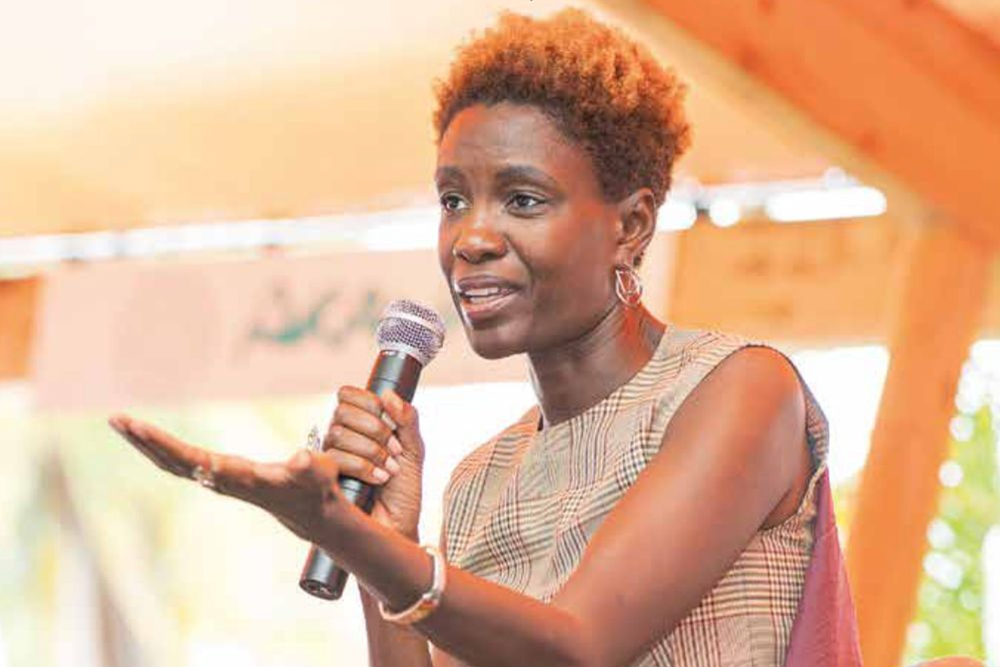
Parisian of Senegalese parents, Rokhaya Diallo is a journalist, writer and director. She no longer needs to be presented in France as she is known for her interventions in public debate and the fight she leads for a more egalitarian French society. She is the first black woman in France to raise her voice against the invisibility of minorities and tackles subjects that have long remained taboo on French soil. She fights against all forms of discrimination – racial, gender and sexual orientation – and travels across Europe to make her voice heard. She is the symbol of this new generation of French people who point their finger and denounce the violence of assimilation at all costs into French culture by ignoring the cultures specific to each one. She is interested in the French overseas territories which cherish and highlight their cultural specificities and advocate a vision of the world not quite identical to that of France despite shared common values. For her, this is proof that cultures can coexist in harmony without hierarchy.

Crédits photos : @François-Xavier PEROVAL
ONAIR – With Corinne and Pierre Sainte-Luce, you are at the origin of the invitation of Ayo Tometi, co-founder of #BLACKLIVESMATTER. Why her?
Rokhaya Diallo – I had the opportunity to discover Arawak Beach Resort during my various visits to Guadeloupe, and through discussions with Pierre and Corinne Sainte-Luce, we mentioned the idea of orienting this hotel towards culture , a place of international exchange. I immediately thought of Ayo Tometi who is first of all a friend, and secondly a person whose commitment has an international resonance and whose struggles could resonate with Guadeloupeans, given the history of the island.
OA – For Guadeloupe, what is the point of receiving a personality such as Ayo Tometi?
RD – Inviting Ayo to Guadeloupe is conferring a different visibility to the island, decentering the gaze that people have on France, inviting a very visible person at the international level in France, without it being in Paris. And remember, Guadeloupe can be a gateway to America.
OA – What are your links with Guadeloupe? You’re here quite often.
RD – I have a fairly strong symbolic link with Guadeloupe because I was invited there for the first time in 2015 to participate in the FEMI Festival and present my first documentary “Les Marches de la Liberté”. It won the prize for best French-language documentary and I was extremely touched. In 2011, Guadeloupean director and activist Brother Jimmy had already made a subject about me in B Word Connection and had introduced me to Guadeloupean activism in this way.
OA – Can the French Caribbean islands influence France’s difficulty in embracing its cultural diversity?
RD – The French islands of the Caribbean are a resounding denial of all the assumptions that say that France is not a multicultural country. France is de facto, by the very constitution of its territory, a multicultural entity, and I believe that looking at France through the overseas territories means understanding its complexity and plurality.
OA – How does the Whole-World-New-World represent the future?
RD – This philosophy of Edouard Glissant is the future because it was thought out by Glissant in the context of colonial violence. A remarkable identity was born both from this violence and through forms of resistance and encounters. The Whole-World movement was born in the French Caribbean from all this and everything the world has to offer.
OA – Are you serene about a more inclusive France?
RD – I am not serene because many people live in very difficult situations, they suffer violence of all kinds because we live in a very brutal period characterized by rejection of otherness, but I am optimistic because I believe in a very politically-aware youth that offer an extremely inspiring vision of the world.

